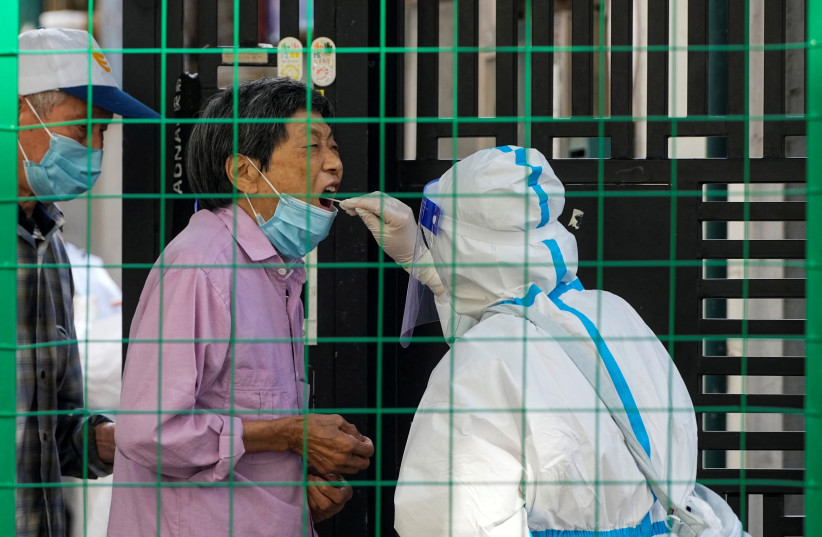Despite reports that the number of COVID-19 cases has grown substantially in China, the Health Ministry in Jerusalem has not yet announced what, if any, measures it will take to prevent an influx of infected people from coming to Israel from that country.
But Prof. Hagai Levine, a leading epidemiologist, public health physician, faculty member of the Hebrew University-Hadassah Braun School of Public Health and Community Medicine and chairman of the Israel Association of Public Health Physicians urges that all who arrive here from China be tested for the new Coronavirus.
“I don’t know how many come from China, but if they are all tested, we would be able to know if it is new variant aside from Omicron. Japan has reported an increase in cases there. There is a possibility that in 2023, there will be growth in number of cases in Israel. We have to prepare.”
An unknown situation in China
The Chinese themselves don’t know, Levine told The Jerusalem Post in an interview, “and media are doing buildup about China, so it’s hard to know what is true. If it spreads from there, it will affect many people’s health and world trade. It’s hard to get accurate data on China. I myself am in touch with Chinese epidemiologists, but it’s difficult to find out the truth.”
China has not reported actual numbers of infected or provided information of any new or old variants, meaning they could be releasing a new virulent Covid wave of unknown deadliness on the world. Alternatively, China could just be dealing with old variants against which many people around the world have been protected from serious complications, thanks to the new Omicron vaccination.
Levine added that “the COVID-19 situation is nevertheless alarming. There is a need for monitoring and preparation for the possibility of a significant increase in morbidity and mortality in Israel. Those arriving now from an outbreak area should be tested here for the virus. But the best preparation is investment in the health system and public health infrastructure. The incoming government must act carefully together with the public.”
US reinstating testing
Unlike Israel, the US is reinstating Covid-19 testing for flights arriving from China. Virologists in the developed world are watching nervously to see how China’s abrupt decision to drop some of its toughest Covid-19 restrictions, including scrapping quarantine rules for travelers, may affect variants and their global spread as some countries increase precautionary measures.
The Health Ministry this week told the four public health funds that it is halting government testing for the virus and handing the responsibility over to them. There also will be no quarantine rules from next week.
Levine said that Moshe Bar Siman Tov, a former senior Treasury official who was Health Ministry director-general under health minister Yaakov Litzman, will apparently be named director-general again (replacing Prof. Nachman Ash) when Shas Party MK Aryeh Deri becomes both Health and Interior Minister. Bar Siman Tov has recently been Deri’s adviser on health matters. “Bar Siman Tov promised as director-general that there won’t be any more hospital patients in beds in the corridors. He has to keep his promise. Every winter, the medical centers have 150% occupancy. More medical staffers plus more hospitalization at home and prevention of infection must be implemented,” the public health physician said.
He also suggested that every local authority in Israel should set up health units and take this into account. If Health Minister Deri and Interior Minister Deri can sit together and do this, it will be beneficial.”
Nearly half of the passengers on two recent flights from China to Milan tested positive for COVID-19, according to Italian health officials. About 38% of passengers on one flight into Milan’s Malpensa Airport tested positive for COVID-19, as did about 52 percent of those on a second flight.
At the end of the 50th week of 2022, in the EU/European Economic Area (EEA) that includes Iceland, Liechtenstein and Norway, the notification rate of COVID-19 cases among people aged 65 years and older increased by seven percent compared with the previous week, reaching 43% of the maximum value reported during the pandemic. The forecasts saw an increase in reported cases in more than half of the countries during the period to the last week of the year.
The impact of this increased transmission is being seen in hospitals: 11 of the 21 countries with data on hospital or ICU admissions/occupancy up to week 50 reported an increasing trend in at least one of these indicators compared to the previous week. Four countries reported increases in deaths, although the pooled EU/EEA death rate decreased by 11% compared to the previous week, with 2,009 deaths reported in the past week.
Increased inter-generational mixing during the year-end holiday season is likely to increase the exposure of vulnerable groups to respiratory viruses. The holidays have also brought about changes in reporting, testing, and healthcare-seeking behavior, which will complicate the interpretation of epidemiological data submitted in the coming weeks.
Japan, India and Taiwan have introduced measures to prevent an influx of cases as experts say lack of data makes it difficult to assess risk.
Virologists are watching anxiously to see how China’s sudden decision to drop some of its toughest Covid-19 restrictions, including scrapping quarantine rules for travelers, may affect variants and their global spread as some countries increase precautionary measures.
China’s decision on Monday to drop quarantine for overseas visitors from January 8 has made ascertaining the spread and severity of Covid more difficult than ever as Beijing has stopped publishing daily case numbers and ended mass testing.




